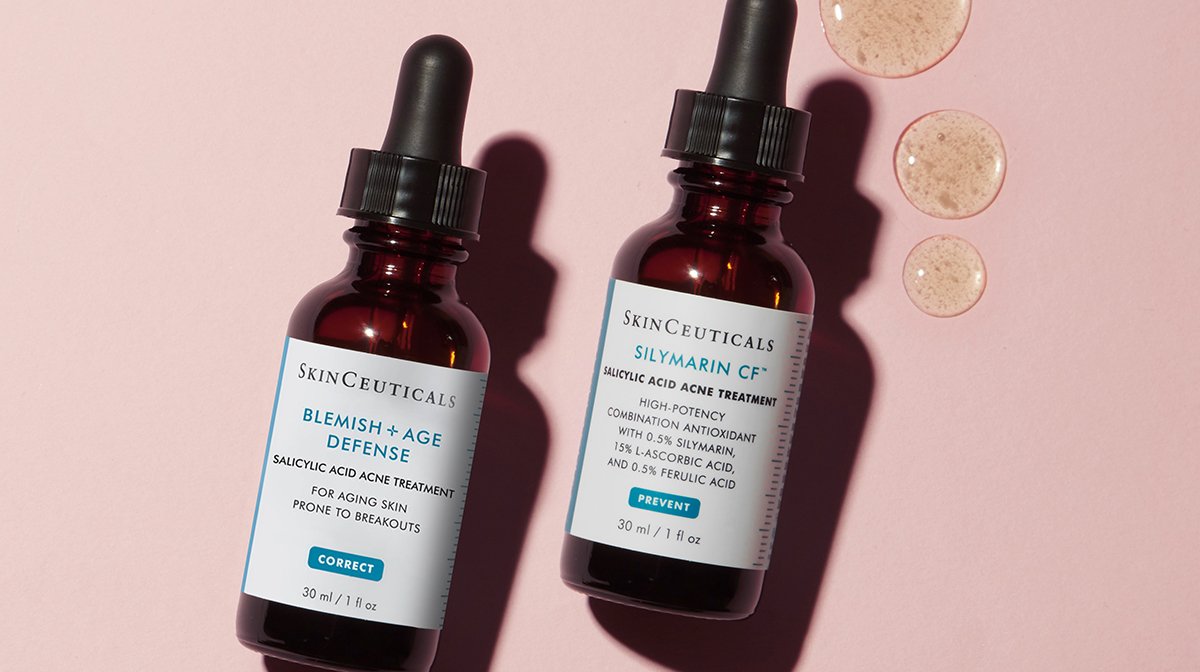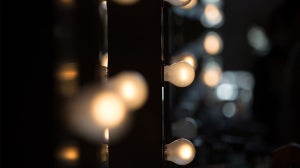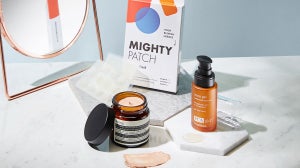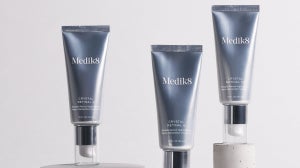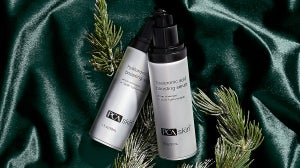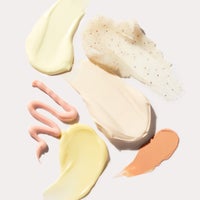
It's happened to us all. You wake up on the morning of a big event only to find a big, red, angry pimple staring back at you in the mirror. While it may seem like this acne blemish popped up out of nowhere, truth be told, it's been a few weeks in the making.
Inflammatory acne is the most common type of acne, and it's also the most frustrating type. It swells the skin, makes it feel tender and painful, and can be tricky to cover up even with the best concealers. And if you think picking and popping it will make it magically shrink and go away, well, we hate to be the ones to tell you it won't. You're far better off taking a hands-off approach and letting a spot treatment work its magic.
Several factors can cause inflammatory acne to the surface of the skin. Even though you want those pimples gone yesterday, the secret to clearing up inflammatory acne once and for is taking a holistic approach to skin care, a lot of patience and using the proper skincare products day in and day out—even when the skin starts to clear. So, devising a complete skincare approach is always best, no matter what's making your skin break out.
Table of Contents:
- What is Inflammatory Acne?
- What Causes Inflammatory Acne?
- The Importance of Skincare for Inflammatory Acne
- Choosing the Right Skincare Products
- Inflammatory Acne Treatments and Skincare Routine
- Easy-to-Follow Lifestyle Tips and Skincare Habits
- When to Consult a Dermatologist
- The Bottom Line
What is Inflammatory Acne?
Inflammatory acne is deeply rooted in inflammation (in fact, all types of acne are) and presents bacteria and presents itself as red, angry, swollen, and sensitive-to-the-touch pimples. Sometimes, inflammatory acne can look like a puffy little blemish, while other times, it is more cystic, nodular or even hidden under the skin. But no matter what an inflammatory acne lesion looks like to the naked eye, it is always accompanied by some degree of inflammation, excessive sebum production, and bacteria occurring within the pore.
No matter the type of acne, all acne, including inflammatory acne, which can occur anywhere on the face and body, particularly the chest, shoulders, back, and butt, arises when a mix of acne-causing bacteria meets a buildup of dead skin cells and sebum, creating a sticky creation that clogs the lining of the pores. The body responds by creating inflammation to heal the skin and quell what's occurring within the pore. The more inflammation called to the area, the more painful, red, swollen and tender the blemish will be as the immune system responds to the breakout.
Although most people associate inflammatory acne with large red, angry pimples, inflammatory acne can manifest in other breakouts. The most common types of inflammatory acne include:
- Papules: These solid red bumps have small pustules of pus at the center of the acne blemish. Papules are the standard type of pimple most of us think of when thinking of acne.
- Pustules: A (usually) white, pus-filled head at the top of an acne blemish. Different from a whitehead, a pustule is surrounded by reddened skin.
- Cysts: Cystic acne is very inflamed, and the acne lesions are usually larger and deep within the skin. There are no 'heads' with cystic acne, and the blemishes are generally soft to the touch and typically painful.
- Nodules: Harder than a cyst, acne nodules feel like a small pebble under the skin. Nodules are either red or flesh-toned and are usually painful.
Related Article: Understanding Acne: A Guide To The Different Types And How To Treat Them
What Causes Inflammatory Acne?
Several different factors contribute to the formation of inflammatory acne. For some people, genetics may be the driving force, while fluctuating hormone levels can lead to an abundance of sebum production, a pro-inflammatory and high glycemic diet that causes blood sugar spikes, and lifestyle choices (think too much stress and poor hydration levels) may instigate inflammatory acne in others. Some hair and makeup products, particularly comedogenic ones, which clog the pores, can also contribute to inflammatory acne, as can certain medications like specific types of steroids.
Even data that suggests that certain types of food, particularly dairy, can increase the incidence of inflammatory acne.
The Importance of Skincare for Inflammatory Acne
Inflammatory acne requires a targeted and precise skincare routine to prevent, treat and control breakouts. By following the proper protocol and utilizing the right ingredients, it is possible to eliminate recurring painful acne breakouts. Keeping the skin clean and daily cleansing are good places to start, but to nip inflammatory acne in the bud, the skin needs more than that.
Consistently using the right acne skincare products to help nourish and hydrate the skin while helping to control the formation of acne can reduce the incidence of inflammatory acne. But treating it requires a few skincare products that will control oil, prevent acne formation, limit inflammation and rid the skin of pore-clogging dead skin cells. Non-comedogenic skincare and makeup (always remove it before bed) products are best since they target multiple causes of inflammatory acne without clogging the pores.
Choosing the Right Skincare Products
Loading the skin with harsh, stripping skincare products can worsen inflammatory acne. That's why gentle, non-irritating skincare products, particularly cleansers, are a must for daily use. For some, a quick double cleanse is the key to helping de-grease the skin, as long as it is gentle, which is perfectly acceptable if non-barrier-damaging cleansers are used. Ingredients like anti-inflammatory salicylic acid, which helps fight congestion, and soothing chamomile and panthenol are instrumental to consider in the fight against inflammatory acne.
A good spot treatment also deserves a home in an inflammatory acne routine. Niacinamide gives the skin a calming and brightening effect while helping to control oil production. Other ingredients with acne fighting capabilities include zinc and sulfur, whereas benzoyl peroxide kills the bacteria and breaks up dead skin cells in the pores.
Sticking with oil-free and non-comedogenic skincare products is also critical, which will help prevent the pores from becoming clogged.
Inflammatory Acne Treatments and Skincare Routine
Keeping inflammatory acne at bay takes dedication to following a consistent skincare routine both morning and night. Not sure where to start and what to use? No worries, we have you covered.
- Always start by cleansing the skin. Use a facial cleanser compatible with acne-prone skin and contains acne-fighting ingredients like benzoyl peroxide or salicylic acid. Make sure to wash the skin morning and night.
- Next, apply acne treatments, be it a spot treatment, a serum or a cream used all over.
- Follow up with a non-comedogenic moisturizer to rehydrate the skin, especially since some acne products can leave the skin dry and flaky.
- Top it off with an oil-free sunscreen to help limit the risk of post-inflammatory hyperpigmentation and scarring.
At night, you’ll want to repeat the same steps (excluding sunscreen) and apply retinol to the skin.
Inflammatory acne doesn't respond overnight or after one day of treating it with the right skincare products. You'll need to follow your skincare routine consistently without fail to limit breakouts over time and improve the skin's health. And even if you don't see instant results, the products are still working. Often, acne products take a bit to show the results—anywhere from a few days to a few weeks, if not longer—which is why patience is vital.
Cleansing and Exfoliation
One of the best things you can do for skin that experiences inflammatory acne is to cleanse it. The purpose of a good morning and nighttime cleansing routine isn't to dry out the skin or strip it of much-needed oils, but rather to lift away dirt, oil and makeup so that the skin is free of any potential pore-clogging debris. Without using a routine cleanser made for acneic skin—they usually contain ingredients like salicylic acid or benzoyl peroxide to help clear up breakouts—the products you apply next in your routine will be combined with whatever is hanging around the skin's surface. That's why it's always best to cleanse with a gentle gel-based cleanser twice daily and cleanse the skin after working out.
Once the skin is clean, you can exfoliate it, which is the best way to unclog the pores. Exfoliators shouldn't be used during every face wash session, but typically, twice a week suffices. The skin is less likely to break out with fewer dead skin cells on the surface. Still, chemical exfoliators that contain glycolic and salicylic acid are recommended for inflammatory acne-prone skin, which gives a smoothing effect to the skin, too.
Serums
Even though acne-prone skin may be susceptible to inflammatory breakouts, the skin is pretty sensitive, so it's essential to incorporate gentle serums that help support the skin variety while clearing up acne.
Key ingredients in serums that work for inflammatory acne include salicylic acid, benzoyl peroxide, sulfur, niacinamide, and retinol. While each has a specific function, their premise is to reduce inflammation, break down oil, reinforce the skin barrier, and increase skin cell turnover. Most acne serums contain high concentrations of any combination of these anti-acne ingredients, helping them heal and subside. And since most acne serums contain higher concentrations of active ingredients, they can irritate and dry out the skin. It's best to ease into using an acne serum, especially if you are new to one, to avoid dryness and other unwanted side effects.
Moisturization and Hydration
Hydration via moisturizing creams and serums is critical for all skin types, acne-prone skin included. And that's especially the case when anti-acne skincare products make up a portion of your regular skincare routine. Since some anti-acne skincare products can dry out the skin and even jumpstart oil production to counteract a loss of sebum, it's essential to incorporate a daily moisturizer for acne-prone skin, which will also help to maintain the skin's barrier function.
However, not any old moisturizer will work. Since acneic skin is easily instigated to form acne lesions and breakouts, it's important always to use lightweight gel-based moisturizers that are oil-free and non-comedogenic to lessen the incidence of clogged pores and breakouts. Stick with lighter formulations during the day, and if you need more hydration at night, you can do a little heavier in the formulation department.
Ceramides and hyaluronic acid are two of the best hydrating ingredients safe to use on acne-prone skin. Both ingredients maintain moisture within the skin but in different ways. Ceramides are lipids, which are fatty acids produced in the sebaceous glands. They help hydrate the skin and strengthen its moisture barrier while shielding the skin from the potentially damaging effects of the weather and pollution. Ceramides are also responsible for maintaining the skin's water-retention function and preventing trans-epidermal water loss by retaining water in the skin.
On the other hand, hyaluronic acid is a clear humectant that attracts and retains moisture in the skin. It binds water in the skin and can hold 1,000 times its weight in water. When hyaluronic acid levels are high, the skin is plump and firm.
Sun Protection
No skin type is immune to the damaging effects of the sun's UV rays—acne-prone skin included. Even though acneic skin may sometimes complain about wearing sunscreen and say it breaks them out, as long as an oil-free, non-comedogenic formula with at least SPF 30 is used, instigating acne shouldn't be a concern. Also, avoid sunscreens that contain fragrances and oils and opt for physical sunscreen over chemical ones.
Wearing sunscreen daily—even when it's cloudy or raining outside—is critical in preventing acne-related post-inflammatory hyperpigmentation (PIH), which can occur after an inflammatory acne breakout. But without sunscreen, the skin is more likely to burn and become inflamed, which can dehydrate the skin, encourage oil production, worsen existing breakouts, and cause further breakouts.
Targeted Treatments
If you want to shrink active breakouts and fast, the best way is with a targeted spot treatment that you can apply directly to individual pimples. But strong doesn't always mean better since overusing a spot treatment can dry out the skin. While the key ingredients in a targeted treatment vary, two tried-and-true ones you're likely to find are salicylic acid, a chemical exfoliator that works well for acne caused by clogged pores, and benzoyl peroxide, which attacks the bacteria in inflammatory acne.
The idea behind any spot treatment, be it a gel, cream, drying lotion, or even a hydrocolloid patch, which helps to drain an acne blemish overnight by pulling the contents of the pimple onto the patch, is to reduce inflammation, redness and any pus that comes to a head and speed up the healing process.
Easy-to-Follow Lifestyle Tips and Skincare Habits
Once you see improvement in your acne from following a specific anti-acne skincare routine, you'll want to stick with it. While it may be cumbersome at times to be diligent about skin care, failing to follow a skincare routine that keeps inflammatory acne in check can cause the blemishes to return. That's why simple is better (unless you can maintain a more complex routine), and the basic skincare steps of gentle cleansing, weekly exfoliating, light hydration, and using non-comedogenic products and sun protection will help set you up for success.
If it helps to write your skincare routine on a sticky note and put it on your mirror, do it. Or, if you need to set a nightly alarm to remember to wash your face and apply a spot treatment, go for it. Whatever will help keep you in line when caring for your skin is worth it!
Improving inflammatory acne can be as simple as making a few lifestyle tweaks. For example, try to limit or cut out sugar-laden foods and other inflammatory foods that can cause internal inflammation levels to rise. You'll also want to ensure you get a good night's rest every night since this is when the skin goes hard to work to heal and revive itself. Stress should be limited, which can be achieved by meditating, journaling or even working out. And, of course, make sure to stay well hydrated and out of the sun, which will reduce inflammation levels and keep the skin healthy.
When toConsult a Dermatologist
Sometimes, a little more help than what a bottle offers is needed. If your acne is severe, extremely painful and doesn't respond to over-the-counter treatments, it's time to seek professional advice from a dermatologist. Remember, other factors beyond diet and stress can cause acne, which your dermatologist can help you to figure out. When hormone overloads cause acne, topical or oral medication may be necessary to help calm the acne. With the help of a dermatologist, a personalized treatment plan can be devised along with the best recommendations for effectively improving the skin's current condition.
The Bottom Line
Not all acne is the same, and inflammatory acne can manifest on the skin in many ways and for several reasons. The best way to treat inflammatory acne is to keep the skin clear, use non-comedogenic and oil-free cleansers, exfoliators, sunscreen, and makeup, and always choose products explicitly formulated for acne-prone skin since they are packed with anti-acne ingredients that will help dwindle existing breakouts.
The key to keeping breakout-prone skin as clear as possible is to follow a specific skincare routine every day. Just because you start to see your acne clearing doesn't mean you can stop caring for and treating your skin. Acneic skin requires a holistic approach to treating inflammatory acne effectively, but with some time, patience and the right skincare products, you'll be on your way to achieving clearer, healthier skin.Shop all skincare for acne-prone skin at SkinStore.

